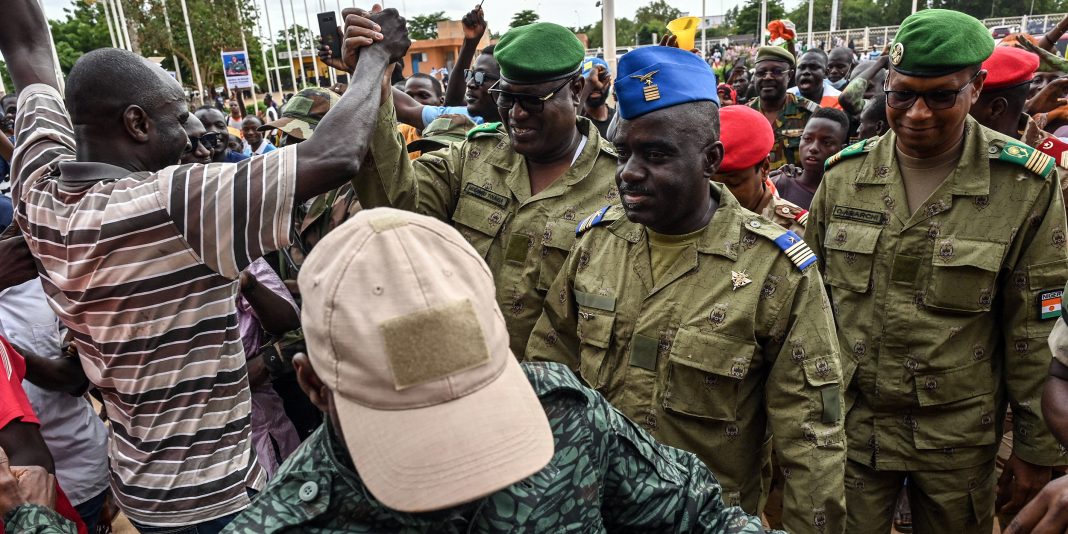Title: The U.S. Military’s Departure from Niger: Unraveling the Truth
Introduction:
For over a decade, the United States maintained a significant counterterrorism partnership with Niger, stationing troops at two airbases. However, this partnership abruptly ended in March 2023 when Niger’s ruling junta announced the expulsion of American military personnel, citing a violation of the country’s constitution. The subsequent events surrounding this expulsion have raised questions about the Pentagon’s transparency and accuracy in communicating the situation to Congress and the American public.
Misleading Congress: Inaccurate Information and Diplomatic Misrepresentation
Shortly after Niger’s announcement, a Pentagon official testified before the House Armed Services Committee, providing misleading information about the situation. Representatives Matt Gaetz and Jimmy Panetta, in a letter shared exclusively with The Intercept, expressed their concerns about the Department of Defense and the Department of State’s communication and dissemination of inaccurate information regarding the withdrawal of U.S. troops from Niger. The letter, addressed to Defense Secretary Lloyd Austin and Secretary of State Antony Blinken, highlighted discrepancies in the Pentagon’s knowledge of Niger’s decision.
The Diplomatic Note: A Contradiction to Testimony
Contrary to the Pentagon’s claims, a diplomatic note from Niger’s junta, shared with The Intercept, revealed that the Status of Forces Agreement governing U.S. troops in Niger had been terminated on March 19. This information directly contradicted the testimony provided by Assistant Secretary of Defense Celeste Wallander, who stated that Niger’s junta had not requested the U.S. military’s departure. Representatives Gaetz and Panetta accused Wallander of misrepresenting the situation, suggesting that she had access to the information but failed to provide accurate details.
State Department’s Silence: Lack of Clarification
When pressed for clarification on the State Department’s communication with Niger’s junta, a department official declined to comment on the details of diplomatic correspondences. This silence further fueled suspicions regarding the accuracy of information shared with Congress and the public. Additionally, a Defense Department spokesperson, Lt. Col. Bryon J. McGarry, failed to respond to questions from The Intercept, raising concerns about the transparency of the Pentagon’s communication.
The U.S. Military’s Presence in Niger: A Troubled Partnership
Before their expulsion, the U.S. had a significant military presence in Niger, with approximately 1,000 personnel deployed, primarily at Air Base 201 near the town of Agadez. This base played a crucial role in America’s surveillance and security efforts in the region, with substantial financial investments made to support its operations. However, despite this partnership, terrorist violence in West Africa, particularly in the Sahel, increased dramatically during this period. Fatalities from attacks by militant Islamist groups surged by over 5,200% since 2016, casting doubts on the effectiveness of the U.S.-Niger partnership.
Coup Involvement and Aid Suspension: A Troubling Pattern
Disturbingly, at least 15 officers who received U.S. security assistance have been involved in 12 coups in West Africa and the greater Sahel during the war on terror. Last year, Niger experienced a coup that toppled its democratically elected president, and several coup leaders had received American assistance. The U.S. initially avoided using the term “coup” but eventually suspended approximately $200 million in aid, as mandated by law. These events highlight the complexities and challenges associated with the U.S.’s security assistance programs in the region.
Ongoing Investigation: Seeking Answers and Oversight
In April, Representative Gaetz released a report detailing the difficult conditions faced by U.S. troops in Niger, alleging a cover-up by the Biden administration and the State Department. Gaetz and Panetta called on Defense Secretary Austin and Secretary of State Blinken to provide answers regarding the communication between the junta and the United States, as well as copies of relevant correspondence. The lawmakers set a deadline for early September, just days before the junta’s imposed deadline for the removal of all U.S. troops from Niger on September 15.
Conclusion:
The expulsion of U.S. military personnel from Niger has raised significant questions about the Pentagon’s transparency and accuracy in communicating the situation. The discrepancies between the Pentagon’s testimony and the diplomatic note from Niger’s junta have fueled concerns about the truthfulness of information provided to Congress and the American public. Additionally, the troubled history of U.S. security assistance in the region, coupled with the surge in terrorist violence, highlights the challenges and complexities of counterterrorism efforts in West Africa. As the investigation continues, it remains crucial to ensure accountability and oversight in the U.S.’s foreign military engagements.


